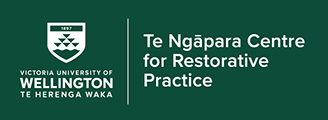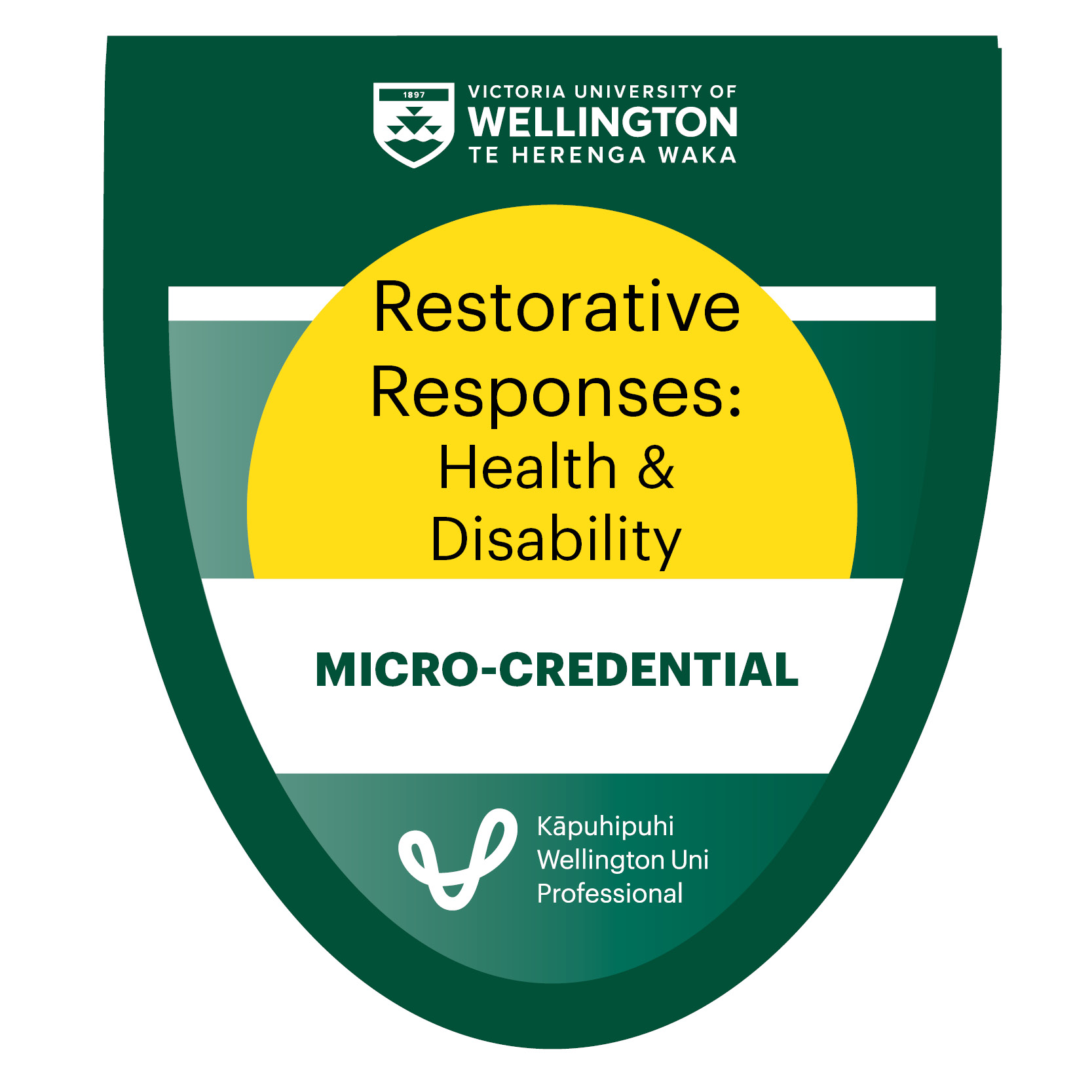Restorative Responses: Health and Disability
Factors critical to the success of restorative practice in a health sector context

Course overview
Te tiro whakamuri kia haere whakamua
We will look back to what has occurred in the past to gain the wisdom to move forward into our future.
In this micro-credential course you will develop knowledge about the factors critical to the success of restorative responses (i.e. restorative practice and hohou te rongo – peacemaking from a Māori worldview). You will understand and practice foundational skills, gain an appreciation of cultural safety, learn how to navigate cross cultural responses and design a restorative response that is relevant to your own context.
Developed by Te Ngāpara Centre for Restorative Practice, Victoria University of Wellington in partnership with the Health Quality & Safety Commission and the National Collaborative for Restorative Initiatives in Health.
In partnership with



What you'll learn
On completion of the course, you will be able to:
- Evaluate the factors critical for success of restorative responses.
- Identify critical aspects of cultural safety and diversity as an authentic Tiriti partner within a restorative response.
- Design and apply a restorative response within your own professional context.
Course modules
You will gain an appreciation of:
- The relational principles, values and goals that underpin restorative responses and the differences/overlaps with other conflict resolution methods (i.e. mediation, facilitation, negotiation).
- How to determine the most appropriate response based on situational assessment (including stakeholder mapping, partnership with Māori, and harms/needs assessment).
- Facilitator skills e.g. preparation and emotional support, creating a safe environment for storytelling, follow up, maintaining the mana and tapu/dignity of all the people involved.
- How to support people (workers, consumers, and investigators) experiencing trauma or emotional distress when involved in an adverse event, conflict, or complaint.
- What it means to be responsible and accountable within a complex adaptive system.
- The characteristics of a meaningful apology from a Pākehā and Māori worldview.
Further Information
Format
This course combines online and in-person components. It begins with self-paced online modules to introduce key concepts, followed by one interactive Zoom sessions, and concludes with a one-day in-person workshop in Wellington. This blended approach allows flexibility while providing opportunities for face-to-face collaboration and feedback. Group size is capped to maximise engagement, and all catering is provided during the in-person session.
This micro-credential is total of approximately 50 hours of learning made up of:
- 1 x 2-hour webinar
- 1 x full-day in-person workshop
- Self-paced learning activities
- Self-study and assessment tasks
Pre-requisite
The Restorative Foundations: Health and Disability micro-credential course is a pre-requisite for this course.
Workload and Assessment
This micro-credential involves approximately 50 hours of total learning, including self-paced online modules, live sessions, and application tasks.
Assessment is comprised of:
- Two reflections (250-words each) 40%
- Restorative Response plan, guidance or process that can be applied within your own professional context (500-words or 5 minutes in length) 60%
All assessment requirements must be completed to pass and earn credit.
What You'll Receive
This course is a university-approved micro-credential worth 5 NZQA Level 7 credits, assessed to meet academic and industry standards. Upon successful completion, you will receive:
- A digital badge
- A digital certificate
- Academic credit recorded on your official Victoria University of Wellington academic transcript
All credentials include the total CPD/PLD hours completed.
University credits achieved may be used through ‘credit transfer’ to stack towards future qualifications. These digital credentials are portable, verifiable, and designed to support both your current role and long-term career advancement.

Scholarship information
Te Ngāpara Centre for Restorative Practice and Kāpuhipuhi Wellington Uni-Professional fund a small number of scholarship places in each cohort. Available scholarships include a 50% discount or fully funding your course fee. Scholarships are available to people working in and with the health sector who have no or limited access to professional development funding. If you would like to be considered for a scholarship, you will need to provide a letter that outlines your role in the health sector and why you want to attend. You will be asked to provide a letter of support from your employer which includes a statement that you have no access to funding or states that they will contribute 50% of the course fee.
Information about how to apply is available by emailing us at profdev@vuw.ac.nz
Please use “Scholarship Request” in the subject line.
What is a micro-credential?
A micro-credential is a formal credential that acknowledges specific skills and knowledge gained through learning programme or activity. These credentials are assessed and meet industry standards, allowing you to demonstrate mastery in particular areas. Our micro-credentials carry University credit at defined level (eg undergraduate or postgraduate) and credit may be used towards further learning. Micro-credentials are designed to be stackable, creating a pathway to further qualifications or career advancement.
Upcoming Courses & Delivery Options
15 Sep 2025 | Wellington
Duration: 6 weeks
$NZD 995
excl. GST
Can’t make these dates or want a private course?







